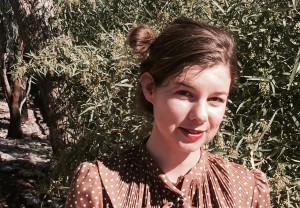
Welcome to “Behind the Byline,” the column in which we share conversations with current NER writers in all genres.
This month, NER fiction reader Rachel Mullis speaks with author Allegra Hyde.
RM: “Shark Fishing” (which appears in NER 35.4) is a haunting meditation on humanity’s relationship with our environment, spanning centuries through the lens of one small island in the Bahamas. What inspired you to write it?
AH: I’ve wanted to write about climate change for a while. Sometimes I question why I’m sitting at a desk all day making up stories when I could be marching through the streets, waving banners, chaining myself to trees. So in a way the story is the product of my guilt. It’s also a product of my uncertainty: an attempt to illuminate an uncertain future with events of the past. The protagonist, like me, is trying to understand how best to address an environmental crisis that can feel overwhelming.
RM: The story reveals fascinating details about Eleuthera’s history. I’m curious what your research process looked like.
AH: I’ve travelled to Eleuthera twice, once as an undergraduate studying renewable energy, and once through a teaching fellowship in Human Ecology. Both trips gave me a chance to observe Eleutheran culture—the fish fries, the Rake and Scrape music, the multi-hour church services—as well as the island’s history. You see history everywhere. It’s inscribed in the landscape. You can walk through abandoned resorts, drive past empty grain silos and colonial architecture, scuba dive in shipwrecks. Even poking around a beach, you might find pieces of Lucayan pottery, hundreds of years old. So by exploring Eleuthera, I was immersed in these layers of overlapping history. Those experiences accounted for much of my research, or at least gave me places to start. I read plenty of books as well. There is a small library of Bahamian history stacked around my desk.
RM: In addition to publishing stories and serving as prose editor at Hayden’s Ferry Review, you are finishing up an MFA at Arizona State University. Any new projects planned post-graduation?
AH: One of the things I struggled with while writing “Shark Fishing” was saying everything I wanted to say within a reasonable page length. Even around 8,000 words, the piece often felt like it was bursting at the seams. Maybe that’s one of the reasons I opted for a fragmentary structure: to let the white space speak for what I couldn’t fit. There still seems to be more to write, though, so I’ve started working on a novel-length version of the story. Stay tuned.
RM: You curate quite an impressive collection of similes on allegrahyde.com. What draws you to comparison above other figures of speech?
AH: There are some simile haters out there—Kafka said “they describe much, but prove nothing”—but to me, a good simile is as delightful as a well-trained bunny, as useful as aluminum foil in an alien invasion, and as indispensable as the pickle that comes with a grilled cheese sandwich.
♦♦♦
Allegra Hyde’s short stories and essays have appeared, in addition to NER, in Missouri Review, North American Review, Chattahoochee Review, and elsewhere. She curates similes at www.allegrahyde.com.